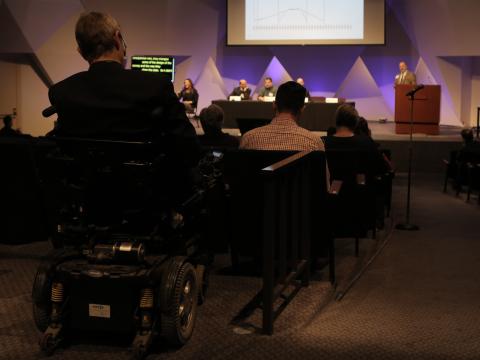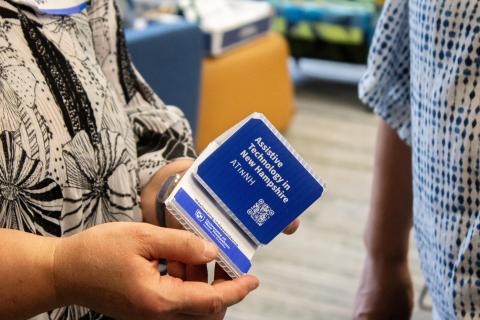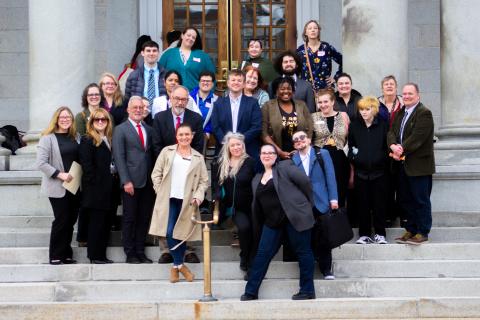Why Accessibility Matters: Celebrating Global Accessibility Awareness Day (GAAD)

Accessibility isn’t just about accommodation—it’s about creating environments where everyone belongs, with features like captioning, high-contrast communications, and inclusive seating that support richer conversations and broader participation.
Each year, Global Accessibility Awareness Day (GAAD) reminds us about the importance of making digital spaces accessible to individuals with disabilities. This day is a time where we can reflect on the progress we have made, and what work we still have ahead of us. With over one billion people worldwide living with a disability, GAAD serves as a reminder of the importance of creating inclusive experiences for all to enjoy.
At the Institute on Disability (IOD), accessibility is at the heart of the mission. Whether it is through educational opportunities or technical assistance. The IOD is working year-round to ensure that people with disabilities can fully participate in all aspects of society, including digital and physical spaces.
Why does accessibility matter?
Accessibility ensures everyone can participate in society by having equal access to information, services, and products without barriers, but why is it important? It is important because it promotes inclusion, empowers individuals, and creates opportunities for everyone. It also enhances user experience, meets legal requirements, and reflects the commitment of being fair and equal. When accessibility is prioritized, we build a more inclusive and connected world.
Megan Henly, research assistant professor, was able to share her thoughts on why accessibility matters. “Accessibility matters because we know that people with disabilities are substantially more likely to be homebound, are less likely to get exercise, and are less likely to have opportunities to socialize on any given day compared to people without disabilities. The way that our physical environments and organizational practices are set up may be contributing to these inequalities, which can have negative effects on the physical and mental health outcomes of people with disabilities.”
How is the IOD making NH more accessible?

While ATinNH is often associated with low-cost fabrication—like the hands-free, multi-use phone/tablet holder pictured here—their work today spans far beyond. Through a statewide lending library and deep partnerships, ATinNH delivers innovative assistive technology solutions that support people of all ages and abilities across New Hampshire.
At the IOD, we work towards a common goal of improving the knowledge, policies, and practices related to the lives of those with disabilities and their families. Across the state, several of our programs are leading the way to build a more accessible future.
One program that works towards this goal is the New Hampshire Disability and Health Program (DHP). This program works to improve the health and quality of life of people with disabilities by implementing evidence-based strategies. A partnership with Gather, a local food pantry, really highlights the impact of this program. The DHP team was able to help Gather improve the accessibility of their membership registration process by recommending the use of plain language, modifications for those with low vision, and the option for adding an accommodation question to ensure all individuals have access to the support they need. “This partnership is an excellent example of a community organization identifying changes to ensure that their programs and services reach all people,” says Emilia Poehlman, DHP Program Manager, “One in five NH adults with disabilities experience food insecurity, so to see an organization make accessibility improvements is exciting for the NH Disability and Health Program.”
Technology also plays a vital role in creating equal opportunities for all. Assistive Technology in New Hampshire (ATinNH) works to ensure that individuals are able to find the correct technology that meets their needs. Through partnerships across the state, individuals can try out different technologies before committing to purchase. Sara Valli, director of ATinNH, was able to share some insights on how ATinNH is making New Hampshire more accessible.
“We are working with agencies across the state to increase access and awareness related to assistive technology so that people can access school, work, recreation, and community events. A big thing is building awareness that there are tools out there that can help you.”
But the most powerful force for change comes from within the disability community itself. The New Hampshire Leadership Series helps equip family members and adults with disabilities with skills that help them become advocates, leaders, and changemakers. One powerful success story is Wendy Chase. After Wendy graduated from the program in 2018, she went on to serve as a New Hampshire State Representative and sponsored legislation to establish supported decision-making. This empowers individuals with disabilities to make their own decisions rather than relying on guardianship. “When the needs of individuals with disabilities and their families are reflected in policy conversations, we come up with better systems," - Sarah Sadowski, director of the NH Leadership Series.

More than 1,000 family members and adults with disabilities have graduated from the NH Leadership Series. These leaders, like those pictured above, advocate with service providers, use the legislative process to achieve change, and organize communities to support inclusion at every level.
Now more than ever, folks have an opportunity to engage digitally in the policy process, such as submitting testimony or comments online or watching hearings remotely. Including digital accessibility in our policy conversations is key to ensuring everyone is equally represented.
What is inaccessible about New Hampshire?
Accessibility in New Hampshire has come a long way, with continuous improvement to make spaces accessible for everyone. However, despite this progress, many places and experiences across the state remain inaccessible.
Emily Pinkham, an Augmentative and Alternative Communications (ACC) specialist with Boothby, an ATinNH Partner, was able to share some insights about what is currently still inaccessible within the assistive technology field in New Hampshire. Emily shared that accessing software-based tools is the biggest challenge she faces. Additionally, she noted that it is difficult to find affordable resources for schools, as many come with high costs and limited trial periods.
Sarah Sadowski, the Project Director for the New Hampshire Leadership Series shared that another area of inaccessibility is outdoor recreation. Here in New Hampshire, outdoor recreation is an important part of life, and having inaccessible trails, parks, and public spaces limits the ability of individuals with disabilities to fully participate and enjoy these experiences.
While New Hampshire has made notable progress towards improving accessibility, significant barriers remain. The insights shared by Emily and Sarah highlight the ongoing challenges individuals with disabilities face to fully access their communities. Addressing these challenges highlights the importance of ongoing advocacy, funding, and creative solutions to make sure everyone can fully access and enjoy all parts of society.